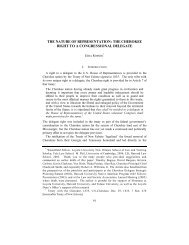Climbing Above the Culture Clash
Climbing Above the Culture Clash
Climbing Above the Culture Clash
You also want an ePaper? Increase the reach of your titles
YUMPU automatically turns print PDFs into web optimized ePapers that Google loves.
“Eighty people signed up in August,<br />
on <strong>the</strong> hottest day of <strong>the</strong> year with a<br />
hurricane brewing off <strong>the</strong> coast,” said<br />
Hurley. “That tells you something<br />
about <strong>the</strong> need for this. This is our<br />
effort to put <strong>the</strong> crisis in perspective.<br />
We do it, not here in <strong>the</strong> Ivory<br />
Tower, but at downtown law firms<br />
where this will all play out.”<br />
While Hurley’s plethora of outreach<br />
programs hits its stride, <strong>the</strong> center’s<br />
graduate program continues to thrive<br />
with more than 70 students and two<br />
dozen adjunct faculty — each one<br />
of whom is an active practitioner in<br />
his or her field of expertise. Hurley<br />
said this adjunct arrangement is in<br />
keeping with <strong>the</strong> school’s philosophy of<br />
providing a practical legal education.<br />
“That’s where <strong>the</strong> expertise is — in<br />
<strong>the</strong> marketplace,” said Hurley, who<br />
previously served as general counsel<br />
for Shawmut Bank, as a partner in a<br />
financial services consulting group,<br />
and as assistant general counsel<br />
to <strong>the</strong> Federal Reserve Board in<br />
Washington, D.C., as it was crafting <strong>the</strong><br />
International Banking Act of 1978.<br />
“The J.D. program is superb at<br />
teaching <strong>the</strong> <strong>the</strong>ory of law, but as you<br />
become more focused <strong>the</strong> need for<br />
practitioners increases. The graduate<br />
program’s faculty consists of law<br />
partners, leaders in key government<br />
agencies, and senior corporate counsel.<br />
With obvious pride, Hurley observes,<br />
“They are in <strong>the</strong> real world dealing with<br />
<strong>the</strong> issues as <strong>the</strong>y come up and share<br />
that experience with our students.”<br />
The stakes couldn’t be higher,<br />
according to Hurley.<br />
“I think we are in <strong>the</strong> process of<br />
fundamentally changing capitalism,”<br />
he said. “How we play this out will say<br />
a lot about ourselves. This goes beyond<br />
beleaguered banks. We have thrown a<br />
federal safety net under <strong>the</strong> entire system.<br />
As we remove elements of that safety<br />
net, it will determine what we become.”<br />
Hurley is hopeful but not optimistic,<br />
based on what he has seen so far.<br />
“The Fed has said quite explicitly that 19<br />
banks — those with assets of more than<br />
$100 billion — will not fail,” he said. “I<br />
think that <strong>the</strong> safety net just puts off <strong>the</strong><br />
day of reckoning. I don’t think we can<br />
afford NOT to let some of <strong>the</strong>m fail.”<br />
“<br />
The ‘Ivory Tower’ has become a pejorative<br />
term <strong>the</strong>se days, but <strong>the</strong> Ivory Tower is not<br />
such a bad perch for assessing what we’re<br />
going through right now.<br />
”<br />
The savings and loan crisis of <strong>the</strong><br />
1980s provides an excellent illustration,<br />
according to Hurley. The government<br />
propped up those dysfunctional<br />
institutions for years based on <strong>the</strong> belief<br />
that, with some help, <strong>the</strong>y would be able<br />
to work <strong>the</strong>mselves out of trouble.”<br />
“But <strong>the</strong>y just got <strong>the</strong>mselves<br />
into deeper trouble,” he said.<br />
The reason is that <strong>the</strong> bailout gave<br />
<strong>the</strong> banks no incentive to change<br />
<strong>the</strong> behavior that got <strong>the</strong>m in<br />
trouble in <strong>the</strong> first place — and<br />
Hurley sees no indication that this<br />
bailout will be any different.<br />
“These 19 banks are hampering <strong>the</strong><br />
economic recovery,” he said. “They<br />
have been reluctant to lend, <strong>the</strong>y have<br />
not changed <strong>the</strong>ir risk management<br />
practices in any significant way, and<br />
we know now that <strong>the</strong>y are back to<br />
<strong>the</strong>ir old compensation practices.”<br />
“My concern is that three years down<br />
<strong>the</strong> road, we will think that things<br />
are better — but nothing will have<br />
changed. We will be just as susceptible<br />
to systemic collapse as we were a year<br />
ago when AIG almost went under.”<br />
As <strong>the</strong> crisis continues, Hurley<br />
is constantly on <strong>the</strong> lookout for<br />
ways to bolster <strong>the</strong> Morin Center’s<br />
position as a thought leader.<br />
“Boston University is a big place,<br />
so in addition to reaching out to<br />
external resources, we need to tap into<br />
<strong>the</strong> wealth of University resources<br />
we haven’t leveraged yet,” he said,<br />
adding that finding <strong>the</strong> solution will<br />
require a cross-disciplinary approach.<br />
For example, <strong>the</strong> issue of outrageous<br />
executive compensation packages is<br />
one of organizational development<br />
and governance — so he would like<br />
to call upon James Post, an expert<br />
on corporate governance at <strong>the</strong> BU<br />
School of Management. He also<br />
hopes to tap such people as Laurence<br />
Kotlikoff in <strong>the</strong> Economics Department<br />
and Zvi Bodie, also of <strong>the</strong> School<br />
of Management, who are nationally<br />
recognized figures in <strong>the</strong> areas of<br />
retirement and investment management.<br />
“If we only come at this problem with<br />
lawyers, it will be like <strong>the</strong> old saying,<br />
‘To a man with a hammer, every<br />
problem looks like a nail,” said Hurley.<br />
University President Robert Brown has<br />
articulated a vision that encourages<br />
multidisciplinary activities at all levels<br />
of <strong>the</strong> University. Hurley and <strong>the</strong><br />
Morin Center are realizing that vision<br />
and enhancing <strong>the</strong> law school and <strong>the</strong><br />
University experience in <strong>the</strong> process. •<br />
For a schedule of upcoming “The Buck Starts Here”<br />
lectures, go to www.bu.edu/law/morincenter. The sessions<br />
are open to <strong>the</strong> public, but preregistration is required.<br />
12 | Boston University School of Law | www.bu.edu/law









